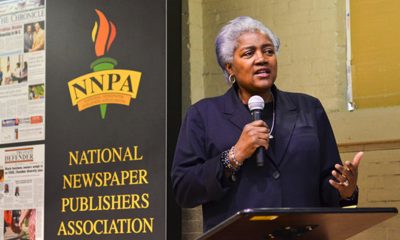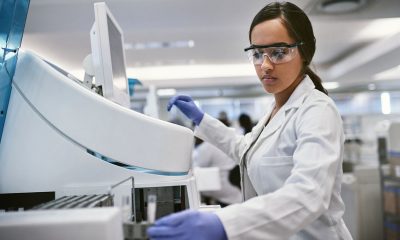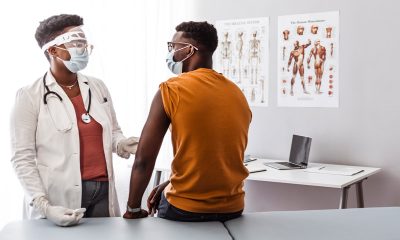Health
Software Turns Smartphones into Tools for Medical Research

In this July 2, 2015 photo, asthma sufferer Elizabeth Ortiz, who uses the Asthma Health smartphone app daily to track her condition, poses for photos at her apartment, on New York’s Lower East Side. Ortiz measures her lung power each day by breathing into an inexpensive plastic device and then typing the results into the app, which also asks if shes had difficulty breathing or sleeping, or taken medication that day. (AP Photo/Richard Drew)
Brandon Bailey, ASSOCIATED PRESS
SAN FRANCISCO (AP) — Jody Kearns doesn’t like to spend time obsessing about her Parkinson’s disease. The 56-year-old dietitian from Syracuse, New York, had to give up bicycling because the disorder affected her balance. But she still works, drives and tries to live a normal life.
Yet since she enrolled in a clinical study that uses her iPhone to gather information about her condition, Kearns has been diligently taking a series of tests three times a day. She taps the phone’s screen in a certain pattern, records a spoken phrase and walks a short distance while the phone’s motion sensors measure her gait.
“The thing with Parkinson’s disease is there’s not much you can do about it,” she said of the nervous-system disorder, which can be managed but has no cure. “So when I heard about this, I thought, ‘I can do this.'”
Smartphone apps are the latest tools to emerge from the intersection of health care and Silicon Valley, where tech companies are also working on new ways of bringing patients and doctors together online, applying massive computing power to analyze DNA and even developing ingestible “smart” pills for detecting cancer.
More than 75,000 people have enrolled in health studies that use specialized iPhone apps, built with software Apple Inc. developed to help turn the popular smartphone into a research tool. Once enrolled, iPhone owners use the apps to submit data on a daily basis, by answering a few survey questions or using the iPhone’s built-in sensors to measure their symptoms.
Scientists overseeing the studies say the apps could transform medical research by helping them collect information more frequently and from more people, across larger and more diverse regions, than they’re able to reach with traditional health studies.
A smartphone “is a great platform for research,” said Dr. Michael McConnell, a Stanford University cardiologist, who’s using an app to study heart disease. “It’s one thing that people have with them every day.”
While the studies are in early stages, researchers also say a smartphone’s microphone, motion sensors and touchscreen can take precise readings that, in some cases, may be more reliable than a doctor’s observations. These can be correlated with other health or fitness data and even environmental conditions, such as smog levels, based on the phone’s GPS locater.
Others have had similar ideas. Google Inc. says it’s developing a health-tracking wristband specifically designed for medical studies. Researchers also have tried limited studies that gather data from apps on Android phones.
But if smartphones hold great promise for medical research, experts say there are issues to consider when turning vast numbers of people into walking test subjects.
The most important is safeguarding privacy and the data that’s collected, according to ethics experts. In addition, researchers say apps must be designed to ask questions that produce useful information, without overloading participants or making them lose interest after a few weeks. Study organizers also acknowledge that iPhone owners tend to be more affluent and not necessarily an accurate mirror of the world’s population.
Apple had previously created software called HealthKit for apps that track iPhone owners’ health statistics and exercise habits. Senior Vice President Jeff Williams said the company wants to help scientists by creating additional software for more specialized apps, using the iPhone’s capabilities and vast user base — estimated at 70 million or more in North America alone.
“This is advancing research and helping to democratize medicine,” Williams said in an interview.
Apple launched its ResearchKit program in March with five apps to investigate Parkinson’s, asthma, heart disease, diabetes and breast cancer. A sixth app was released last month to collect information for a long-term health study of gays and lesbians by the University of California, San Francisco. Williams said more are being developed.
For scientists, a smartphone app is a relatively inexpensive way to reach thousands of people living in different settings and geographic areas. Traditional studies may only draw a few hundred participants, said Dr. Ray Dorsey, a University of Rochester neurologist who’s leading the Parkinson’s app study called mPower.
“Participating in clinical studies is often a burden,” he explained. “You have to live near where the study’s being conducted. You have to be able to take time off work and go in for frequent assessments.”
Smartphones also offer the ability to collect precise readings, Dorsey added. One test in the Parkinson’s study measures the speed at which participants tap their fingers in a particular sequence on the iPhone’s touchscreen. Dorsey said that’s more objective than a process still used in clinics, where doctors watch patients tap their fingers and assign them a numerical score.
Some apps rely on participants to provide data. Elizabeth Ortiz, a 48-year-old New York nurse with asthma, measures her lung power each day by breathing into an inexpensive plastic device. She types the results into the Asthma Health app, which also asks if she’s had difficulty breathing or sleeping, or taken medication that day.
“I’m a Latina woman and there’s a high rate of asthma in my community,” said Ortiz, who said she already used her iPhone “constantly” for things like banking and email. “I figured that participating would help my family and friends, and anyone else who suffers from asthma.”
None of the apps test experimental drugs or surgeries. Instead, they’re designed to explore such questions as how diseases develop or how sufferers respond to stress, exercise or standard treatment regimens. Stanford’s McConnell said he also wants to study the effect of giving participants feedback on their progress, or reminders about exercise and medication.
In the future, researchers might be able to incorporate data from participants’ hospital records, said McConnell. But first, he added, they must build a track record of safeguarding data they collect. “We need to get to the stage where we’ve passed the privacy test and made sure that people feel comfortable with this.”
Toward that end, the enrollment process for each app requires participants to read an explanation of how their information will be used, before giving formal consent. The studies all promise to meet federal health confidentiality rules and remove identifying information from other data that’s collected. Apple says it won’t have access to any data or use it for commercial purposes.
Some studies will always require in-person interaction or supervision by a doctor, experts say. But by reaching more people and gathering more data, advocates say smartphone apps can help doctors answer more subtle questions about a disease.
“Diseases like asthma are very complicated. They’re not caused by a single gene or environmental influence,” said Eric Schadt, a genomics professor who’s using an iPhone app to study asthma at New York’s Icahn School of Medicine at Mount Sinai. “The only hope you have of really going further in resolving this disease is for researchers to get to more people.”
Copyright 2015 The Associated Press. All rights reserved. This material may not be published, broadcast, rewritten or redistributed.
###
Activism
2024 in Review: Seven Questions for Frontline Doulas
California Black Media (CBM) spoke with Frontline Doulas’ co-founder Khefri Riley. She reflected on Frontline’s accomplishments this year and the organization’s goals moving forward.
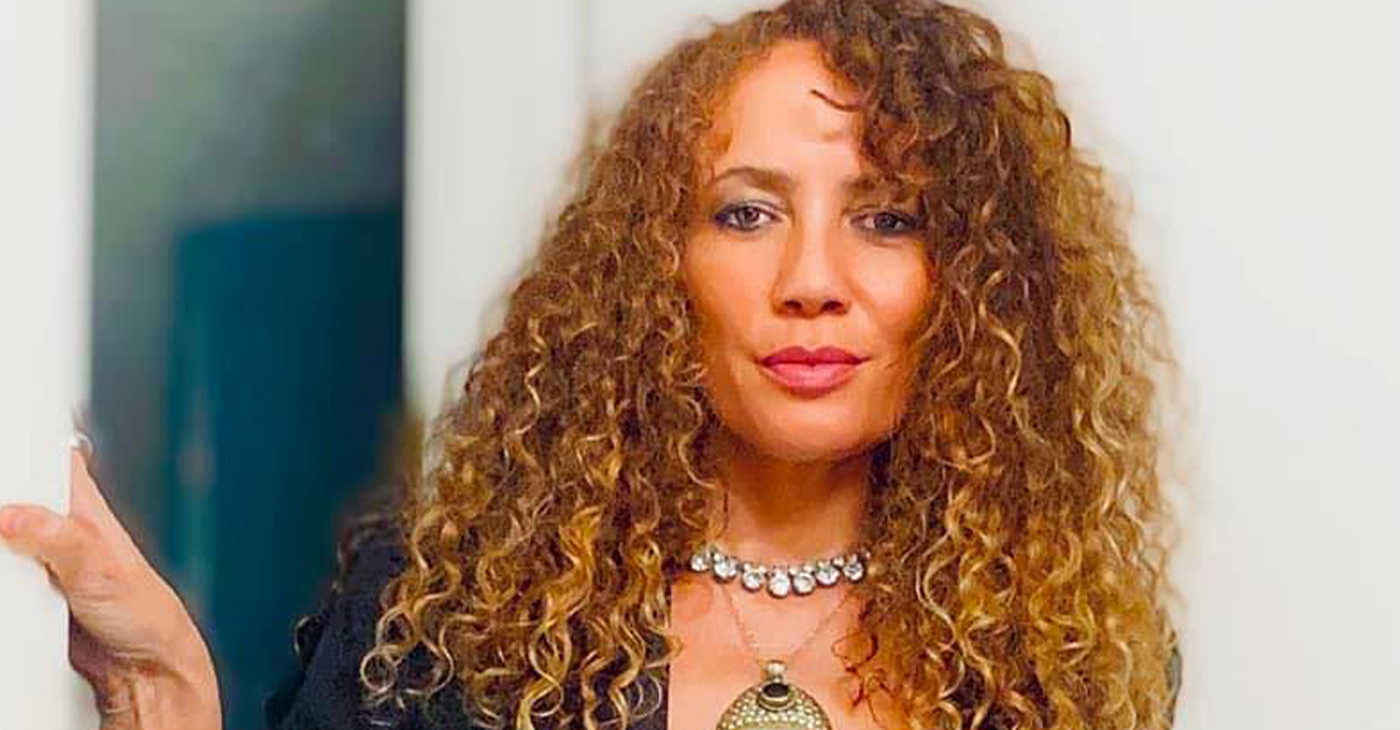
By Edward Henderson, California Black Media
Frontline Doulas provides African American families non-medical professional perinatal services at no cost.
This includes physical, emotional, informational, psychosocial and advocacy support during the pregnancy, childbirth and postpartum period. Women of all ages — with all forms of insurance — are accepted and encouraged to apply for services.
California Black Media (CBM) spoke with co-founder Khefri Riley. She reflected on Frontline’s accomplishments this year and the organization’s goals moving forward.
Responses have been edited for clarity and length.
Looking back at 2024, what stands out to you as your most important achievement and why?
In 2024, we are humbled to have been awarded the contract for the Los Angeles County Medical Doula Hub, which means that we are charged with creating a hub of connectivity and support for generating training and helping to create the new doula workforce for the medical doula benefit that went live in California on Jan. 1, 2023.
How did your leadership and investments contribute to improving the lives of Black Californians?
We believe that the revolution begins in the womb. What we mean by that is we have the potential and the ability to create intentional generational healing from the moment before a child was conceived, when a child was conceived, during this gestational time, and when a child is born.
And there’s a traditional saying in Indigenous communities that what we do now affects future generations going forward. So, the work that we do with birthing families, in particular Black birthing families, is to create powerful and healthy outcomes for the new generation so that we don’t have to replicate pain, fear, discrimination, or racism.
What frustrated you the most over the last year?
Working in reproductive justice often creates a heavy burden on the organization and the caregivers who deliver the services most needed to the communities. So, oftentimes, we’re advocating for those whose voices are silenced and erased, and you really have to be a warrior to stand strong and firm.
What inspired you the most over the last year?
My great-grandmother. My father was his grandmother’s midwife assistant when he was a young boy. I grew up with their medicine stories — the ways that they healed the community and were present to the community, even amidst Jim Crow.
What is one lesson you learned in 2024 that will inform your decision-making next year?
I find that you have to reach for your highest vision, and you have to stand firm in your value. You have to raise your voice, speak up and demand, and know your intrinsic value.
In a word, what is the biggest challenge Black Californians face?
Amplification. We cannot allow our voices to be silent.
What is the goal you want to achieve most in 2025?
I really would like to see a reduction in infant mortality and maternal mortality within our communities and witness this new birth worker force be supported and integrated into systems. So, that way, we fulfill our goal of healthy, unlimited birth in the Black community and indeed in all birthing communities in Los Angeles and California.
Activism
A Student-Run Group Provides Critical Support Services to Underserved Residents
Those visiting The Suitcase Clinic can get legal advice, sign up for food assistance, receive housing resources, get medical help, or enjoy a hot, fresh meal. They can also get haircuts and foot washes from the student volunteers. Nilo Golchini, executive director of the clinic, said one of the goals for most of the students working there is helping bridge the gap of trust that exists between many unhoused people and the healthcare and social welfare systems.
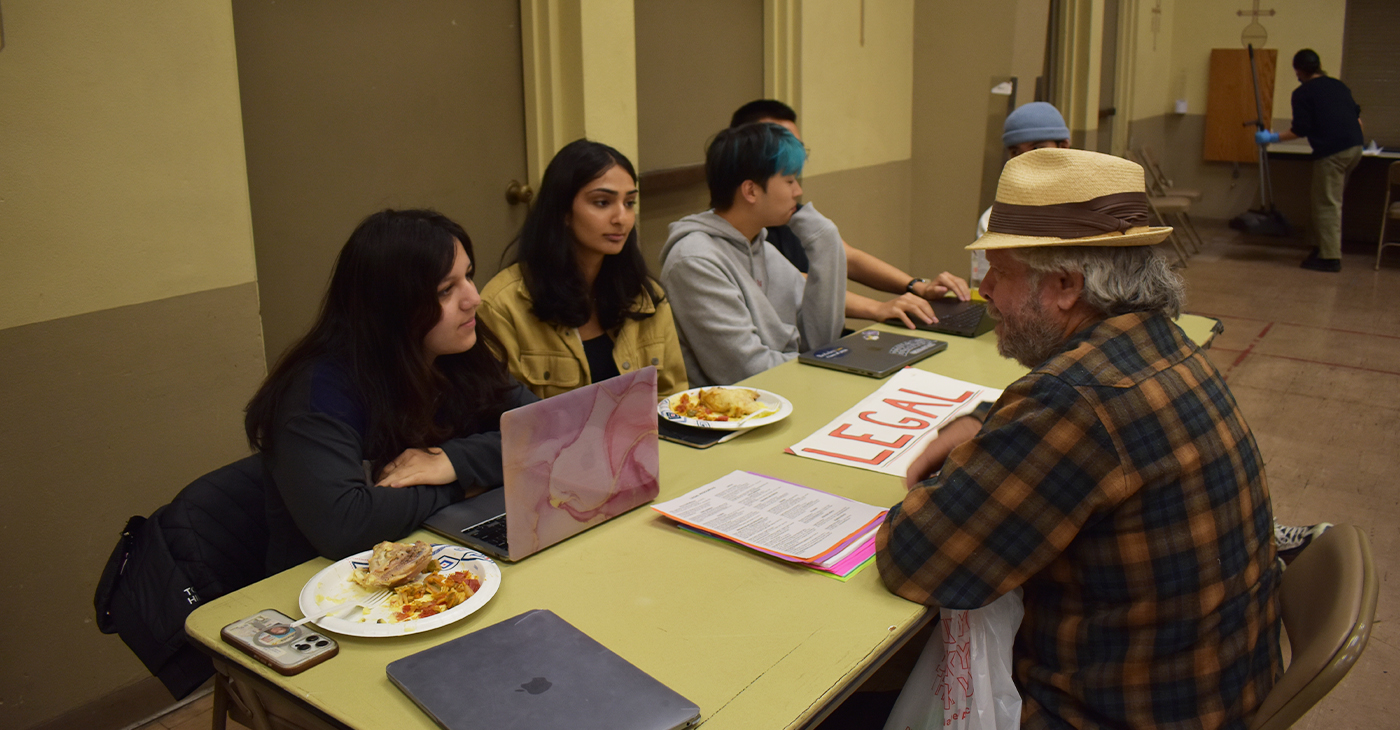
Part One
By Magaly Muñoz
Every Tuesday evening, the dining hall of First Presbyterian Church fills up with dozens of people eating, laughing and moving from table to table, receiving much-needed services from UC Berkeley students – just a few blocks away from the university’s campus.
Individuals seeking support services can be found in this multi-stationed room on the south end of the church talking to law students, student case managers, or receiving medical attention in a corner by healthcare professionals.
This weekly event is hosted by Cal students through a volunteer-run program called The Suitcase Clinic.
The clinic, founded in 1989, was intended to offer free resources to underserved communities in Berkeley and surrounding cities. The majority of the clinic’s clientele are unhoused or low-income people looking for extra support.
Those visiting the clinic can get legal advice, sign up for food assistance, receive housing resources, get medical help, or enjoy a hot, fresh meal. They can also get haircuts and foot washes from the student volunteers.
Nilo Golchini, executive director of the clinic, said one of the goals for most of the students working there is helping bridge the gap of trust that exists between many unhoused people and the healthcare and social welfare systems.
During their tenure in the program, many of the students say they become strong advocates for homelessness rights.

Visitors of the Suitcase Clinic can receive haircuts and foot washing by student volunteers every Tuesday evening. Photo by Magaly Muñoz.
“We’re also standing in solidarity with them. So, it’s not saying, ‘I’m going to help you, but I’m also going to stand with you,’” Golchini said.
Student volunteers get extensive training prior to working directly with clients. Those interested have to take a semester-long class to become versed in areas such as outreach, intersectionality, how to interact with unhoused people, how to sign people up for social services. and more.
Volunteers then get to pick from three different clinics: General, Women’s, or Youth and LGBTQ+.
The General Clinic is the most popular among visiting residents, while Women’s and Youth/LQBTQ+ have more specialized services for attendees.
The Women’s Clinic has many of the similar services to General, but also includes nail painting, childcare, and massages.
The Youth and LGBTQ+ Clinic offers a safe space for young people navigating living on the streets, with services that include housing referrals, wellness and recreation classes and employment resources.
Golchini explained that it’s important for them to keep these clinics separate because the different demographics experience poverty and homelessness differently than those who visit the General Clinic.

Suitcase Clinic student workers posing for a photo with a frequent clinic attendee. The Clinic is open to Berkeley unhoused and low-income residents who need medical or legal service, or a hot meal. Photo by Magaly Muñoz.
“We’re able to provide spaces where people can come in and feel safe and not feel like they’re constantly worried that something’s going to happen to them,” she said.
An outreach team also visits encampments every other Saturday in the Berkeley area to provide hygiene kits and encourage people to visit the in-person clinic, if possible.
However, Golchini said engagement has been low for some time now due to a recent decision by the U.S. Supreme Court that allows cities to ban and cite people for sleeping on the streets.
She said a lot of their clientele got displaced to other cities over time, making it difficult to stay in contact with the services the Clinic was providing for them.
But that hasn’t slowed down the students at the Clinic, if anything, it has pushed them to do more for the community they serve.
Activism
Post News Group Hosts Second Virtual Town Hall on Racism
“While our society tends to rebrand over the decades, we find hate as the new word, broadening its arch of issues in society,” said show host and Post News Group Global Features Journalist Carla Thomas. “However, the very first form of hate, which is racism, built this country.”
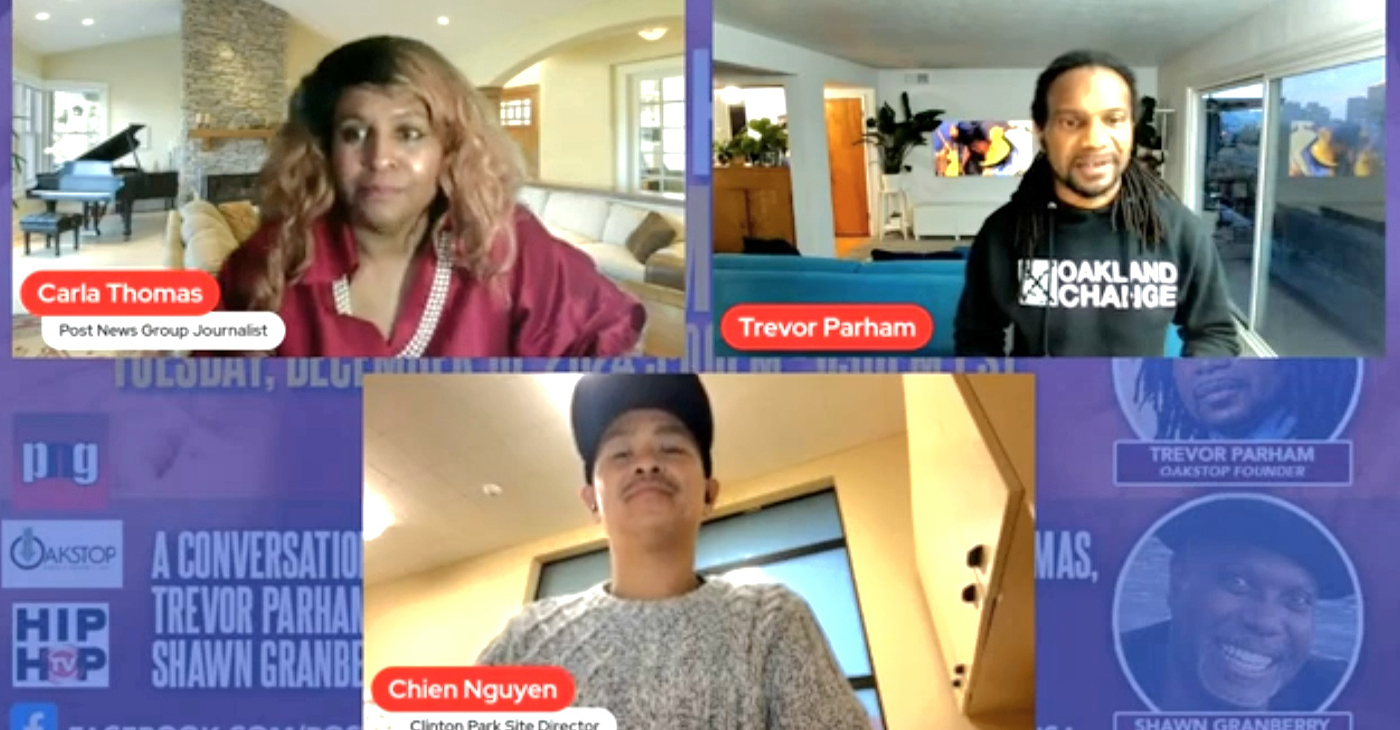
By Post News Group
Post News Group Global Features Journalist Carla Thomas recently hosted a second Virtual Town Hall on Racism, with guests including community builders Trevor Parham of Oakstop and Chien Nguyen of Oakland Trybe.
Thomas opened the town hall by paying homage to the ancestral losses of the African diaspora and to the Indigenous tribes, the enslaved, the freed, and the trailblazers of the Civil Rights Movement, Black Lives Matter Movement, and those more recently victimized by police brutality.
After thanking Bay Area non-profits for their work, Thomas led a thoughtful discussion on the importance of acknowledging racism as the first form of hate that built America.
“While our society tends to rebrand over the decades, we find hate as the new word, broadening its arch of issues in society,” she said. “However, the very first form of hate, which is racism, built this country,” she said.
“That act of othering, creating a narrative that made African people, indigenous people, and ultimately melanated people, labeled as less than human justified the colonizers act of subjugating our ancestors to inhumane, incomprehensible treatment for over 400 years,” said Thomas.
Parham of Oakstop, located at 1721 Broadway, explained that Nazi Germany patterned its mistreatment and extinction of Jews in the Holocaust after chattel slavery in America and the Jim Crow apartheid system that followed it.
“Nazi Germany found America’s treatment of Blacks so inhumane and denigrating that they (decided) it would actually be the perfect ingredient to undermine another group of people,” said Parham. “So, they essentially borrowed from what Americans did to Black people.”
Thomas pivoted the discussion to the limitations placed on Black America’s generational wealth through policies of red-lining, redevelopment, and title deeds to this day, based on the idea that no Black or indigenous person is allowed to purchase property or land.
“For this reason, there continue to be impoverished Black communities throughout the nation,” she said.
“The structures of racism from red-lining to lack of access to capital continue to restrict Black (people) in America; this structural racism kind of finishes you before you even start,” added Parham. “The lack of generational wealth has left our communities at a disadvantage because with generational wealth we’d have the resources to police our own communities and build further.”
Nguyen, Clinton Park site director for Oakland Trybe, spoke about his parents’ journey as immigrants from Vietnam, the challenges of being teased in school, and how his troubled brother was murdered.
Nguyen has turned his personal tragedies into triumph, pivoting from a career as an eight-year business owner in the Little Saigon community of East Oakland, to now a non-profit leader transforming and reclaiming the community’s Clinton Park at International Boulevard and Sixth Street..
“A park represents community, and between the pandemic, illegal activities, and homelessness, the park needed to be re-established, and we now offer programming for the youth and extended community,” he said.
“Between Oakstop’s business model of purchasing commercial properties and transforming them into beautiful spaces for community ownership, business space, and special event hubs, and Oakland Trybe’s ability to transform public spaces central to a community and empower our communities, we have solutions,” Thomas said.
Throughout the conversation, Parham referred to a press conference hosted at Oakstop in August where NBA icons Jason Kidd and Jaylen Brown pledged to raise $5 billion for Black businesses in the nation.
“Inspired by Black Wall Street, Jaylen began with Boston and created the Boston Xchange because he became aware of a statistic noting that white households in Boston average $250,000 and Black households averaged a mere $8 in wealth,” Parham said.
In Oakland, he established the Oakland Xchange to expand the movement right at Oakstop, he said.
Thomas encouraged viewers to connect with her guests and tap into the dozens of organizations making a change. “I encourage you to join your chambers of commerce, your community-based organizations, non-profits, and churches to uplift and rebuild the community,” she said.
Thomas also suggested that the NAACP as a great start. “The Oakland chapter’s resolution developed around racism was adopted by the national NAACP, and at the Afrotech Conference, national NAACP leader Derrick Johnson announced a $200 million fund to support Black funders.”
Thomas informed viewers of the California vs. Hate, initiative, a non-emergency hate incident and hate-crime reporting system to support individuals and communities targeted for hate.
“Your reports inform the state of where to designate resources and extra support,” said Thomas.
For more information, visit PostNewsGroup.com, CAvsHATE.ORG or call 1-833-8-NO-HATE.
-

 California Black Media4 weeks ago
California Black Media4 weeks agoCalifornia to Offer $43.7 Million in Federal Grants to Combat Hate Crimes
-

 Black History4 weeks ago
Black History4 weeks agoEmeline King: A Trailblazer in the Automotive Industry
-

 California Black Media4 weeks ago
California Black Media4 weeks agoGov. Newsom Goes to Washington to Advocate for California Priorities
-

 California Black Media4 weeks ago
California Black Media4 weeks agoCalifornia Department of Aging Offers Free Resources for Family Caregivers in November
-

 Activism3 weeks ago
Activism3 weeks agoOakland Post: Week of November 27 – December 3, 2024
-

 Activism4 weeks ago
Activism4 weeks agoOCCUR Hosts “Faith Forward” Conference in Oakland
-

 Activism4 weeks ago
Activism4 weeks agoRichmond Seniors Still Having a Ball After 25 Years
-

 Activism2 weeks ago
Activism2 weeks agoButler, Lee Celebrate Passage of Bill to Honor Congresswoman Shirley Chisholm with Congressional Gold Medal



